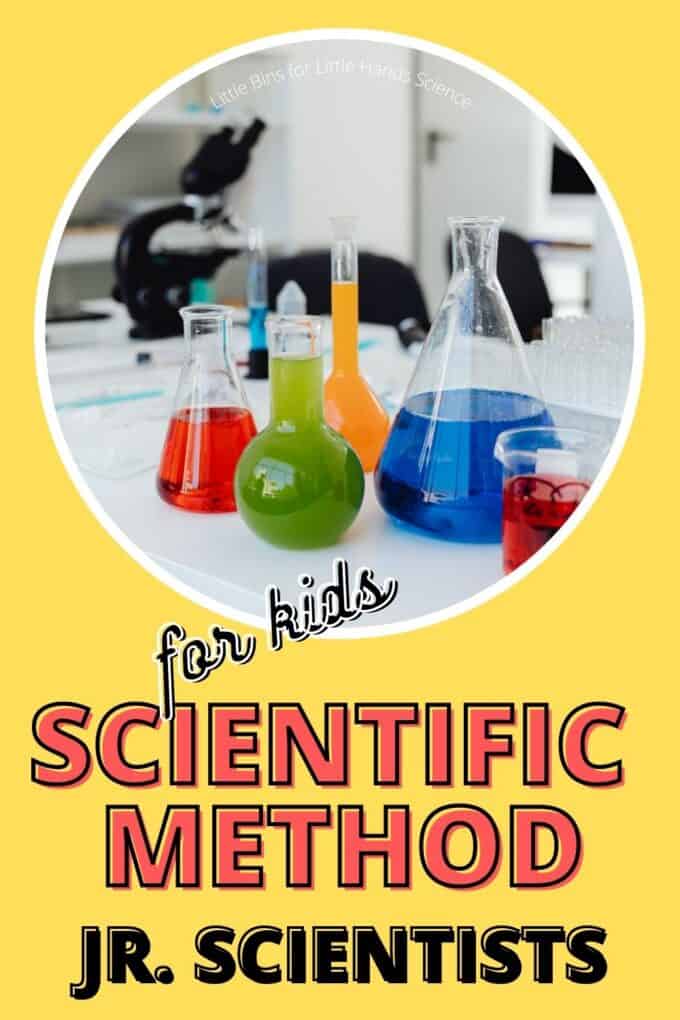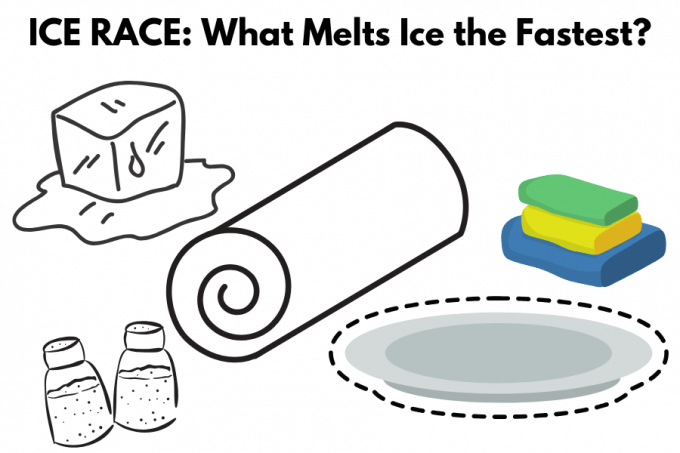Things That Sink In Water
Kids question the world around them every day and there is so much to learn through experimentation with unproblematic materials. You can absolutely begin using the scientific method with young kids. Below nosotros'll share with yous, how and when to introduce the scientific method for kids. In that location are so many different ways to enjoy science activities and the fundamental is choosing the right i for your kids!
USING THE SCIENTIFIC METHOD FOR KIDS!

WHAT IS SCIENCE AND WHY Acquire IT?
The word "science" comes from the Latin word that means knowledge. And so we can remember of science every bit a way to gain knowledge of the world effectually us!
The word "method" comes from the Greek give-and-take that means road. If you put the words "science" and "method" together, you get something like the road or path to gaining knowledge.
This is called the scientific method! A mode to figure things out or a process to gain knowledge.
WHAT IS THE SCIENTIFIC METHOD FOR KIDS?
The scientific method is a process or method of research. A trouble is identified, data about the problem is gathered, a hypothesis or question is formulated from the information, and the hypothesis is put to test with an experiment to bear witness or disprove its validity. Sounds heavy…
What in the globe does that hateful?!? The scientific method should simply exist used equally a guide to help lead the process. It's not set in stone.
You don't need to endeavor and solve the world'south biggest science questions! The scientific method is all about studying and learning things right around you.
Every bit children develop practices that involve creating, gathering data evaluating, analyzing, and communicating, they tin apply these critical thinking skills to whatsoever situation.
WHAT IS A SCIENTIST FOR KIDS?
A scientist is someone who starts with questions, so kids make swell scientists! Equally kids explore the natural globe they have questions only like real scientists.
Scientists build on facts and obtain new knowledge in regard to their question. They often work in small steps to slowly add together to their understanding.
Can YOUNG KIDS USE THE SCIENTIFIC METHOD?
Kids are great scientists at whatever historic period and can apply the scientific method or science practices in context to what they are learning. Information technology can be adapted for any age!
The scientific method is a useful tool for introducing kids to a logical fashion to solve scientific problems.
Scientists use the scientific method to study, learn, and come with an answer!
The scientific method is a process that helps double-cheque that answers are correct and the correct results are obtained through careful planning. Sometimes the guesses and questions change every bit y'all run your experiments.
Kids can use the scientific method as well on questions that are relevant to them!
Let's intermission the scientific method for kids down into half-dozen parts, and you lot tin hands see how each of these parts can be incorporated into your adjacent science experiment. Presently we will be adding more on what is at present referred to every bit best scientific discipline practices for use with NGSS.
You tin also choose to use the principles of the scientific method in a way that makes sense depending on the ages and abilities of your kids.
Looking for piece of cake to print activities, and inexpensive scientific discipline experiments?
We have you covered…
Click below to get your quick and like shooting fish in a barrel science activities.

The Scientific Method Includes…
- Making initial observations,
- Coming up with a question of interest that is based on the observations
- Developing a hypothesis or prediction to go on with the question
- Experimenting and testing
- Gathering and recording results of tests and experiments and drawing conclusions
- Sharing and discussing results
Whoa… Wait A Minute! That sounds like a lot for a immature kid!
You are admittedly right. Depending on your child'due south abilities, following all half dozen steps precisely is just not going to go well. Someone is going to get frustrated, bored, and turned off from just how cool scientific discipline tin can be. We definitely practise not want that to happen!
The Scientific Method For Preschoolers
Use the half-dozen steps of the scientific method as a guideline in the dorsum of your listen. You can actually comprehend most of the steps pretty well merely by talking with your kids virtually…
- what they call back will happen
- what is happening
- what actually happened compared to what they idea would happen .
No writing required! It's as well best to pick some pretty straight frontwards ideas that aren't overly involved or complicated to set up and examination. In fact, kids always have burning questions and "what if's".
See if you tin can tackle their side by side "what if" using the scientific method past listening carefully to their conversations. You can fifty-fifty have them go along a journal with their "what if" questions for your next science time.
YOU MAY ALSO LIKE: Scientific discipline Activities For Preschoolers
SCIENTIFIC METHOD STEPS
The vi steps to using the scientific method are outlined below and are bully for science at habitation with your kids or in the classroom! We have also included unproblematic scientific method experiments.
You tin download our FREE Scientific Process journal pages and check out our NEW Quick STEM Activities Design Process starter pack below!
Water ice Science Experiments are perfect for this! Try these 3 today.

1: Make Observations
In that location are tons of everyday activities that would brand cool science experiments using the scientific method. Listen to what your kids talk nearly and see happening. My son noticed that ice melted pretty fast in his h2o.
You can likewise use this i: What Dissolves In Water?
2: Come Up With A Question
Your kids' observations should pb to some sort of question. For my son and his ice observations, he came up with his ain question. Does ice melt faster in different liquids? His curiosity on what happens to the ice in liquids is a uncomplicated science experiment perfect for using the scientific method.
Side by side! Practise Some research and come with ideas!
3: Develop a Hypothesis or Prediction
- You have made your observations…
- And y'all have your question…
- Now you lot need to make a prediction most what you remember will happen.
A hypothesis is not but a estimate! It's a argument of what you believe will happen based on the information y'all have gathered.
My son thinks that ice will melt faster in juice than it volition in water. Peradventure he just wants to get a drink of juice out of information technology.
4: Acquit An Experiment
We made a prediction that water ice will melt faster in juice than it volition in water, and now nosotros have to examination our hypothesis. We set up upwards an experiment with a drinking glass of juice, a glass of water, and an ice cube for each.
For the best experiments, simply ane thing should change! Hither, we are irresolute the type of liquid we employ but keeping the ice cube, the temperature, and measurements of the liquid the aforementioned. If too many factors modify at once, you can not accurately state what the results are.
The liquids should be roughly the same temperature (equally close as possible) and measured to the same amount, so we left them out to come to room temperature. This could also be tested right out of the fridge!
Prepare a stopwatch or set a time limit to observe the changes!
5: Record Results and Draw Conclusions
Make sure to record what is happening as well as the results. Note changes at specific time intervals or afterward one set fourth dimension interval.
- Annotation when each ice cube is completely melted.
- Add drawings if you wish of the setup up and the end results.
- Was your prediction accurate? If it was inaccurate, record why.
- Write out a final conclusion to your experiment.
6: Results
This is the opportunity to talk about your hypothesis, your experiment, your results, and your determination!
ALTERNATIVE IDEAS: Switch out an water ice cube for a lollipop or change out the liquids using ones like vinegar and cooking oil.
SCIENTIFIC METHOD FOR YOUNGER KIDS!
Every bit I discussed briefly above, even kindergarten and preschoolers tin can go exercise using the scientific method with assist from the participating adult. You can achieve this just through chat during a science experiment! (Separate printable sheets below besides!)
Get the kiddos thinking and asking questions through your prompts, and they will exist well on their way to mastering the scientific method!
SCIENTIFIC METHOD EXAMPLES
What's magnetic and what'due south non or what sinks and what floats types of experiments are neat do for using the scientific method.
Pace i: Your child notices that something has sunk in a bowl of water.
Stride 2: He asks if all things sink in water.
Step 3: You lot ask what he thinks volition happen if he puts different things in the water. He thinks they will all sink because they are to heavy.
STEP 4: You set up a container of h2o and an assortment of objects that will either sink or float {best to have a expert mix}. With each item your kid picks upward, have him/her tell y'all whether it will sink or float before letting go of the detail.
STEP v: Your kid will immediately draw a determination about each individual object. So he can too draw a terminal determination based on his initial prediction that all things volition sink in the water because they are to heavy. Do all things sink in water?
I still can remember back to that very first baking soda and vinegar science experiment, the wonder in his eyes, and the way he giggled with each reaction. The amazement that came from a simple chemical reaction {that pretty much anyone can try} was awesome!
That single experiment has fueled his love of science and together nosotros are using the scientific method in our science activities every fourth dimension we gear up upwards a new experiment.
SUGGESTED BOOKS:
Ada Twist, Scientist past Andrea Beaty
How To Call up Like a Scientist: Answering Questions by the Scientific Methodby Stephen P. Kramer (older kids)
Investigating the Scientific Method with Max Axion, Super Scientist (Graphic Science) past Donald B. Lemke (older)
xi Experiments that Failed by Jenny Offil and Nancy Carpenter
Mad Margaret Experiments with the Scientific Method (In the Science Lab) by Eric Mark Baum
What is Science? by Rebecca Kai Dotlich (younger)
Zoe and Sassafrass Serial past Asia Citro
SCIENTIFIC METHOD EXPERIMENTS
For more ways to utilize the scientific method for kids, click on the links beneath.
- Egg Experiments
- Slime Science Experiments
- Water Experiments
- Chemistry Experiments
- Simple Physics Experiments
- Edible Scientific discipline Experiments
Looking for piece of cake to print activities, and inexpensive scientific discipline experiments?
We have you covered…
Click below to go your quick and easy science procedure pack to add to your next science action.

Things That Sink In Water,
Source: https://littlebinsforlittlehands.com/using-scientific-method-experiments-kids
Posted by: gomerabst1968.blogspot.com


0 Response to "Things That Sink In Water"
Post a Comment